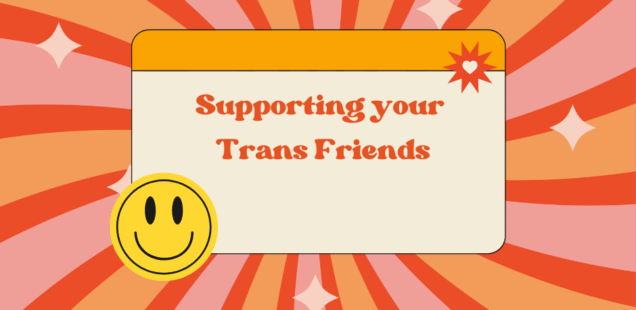
Tips for Supporting Your Trans Friends
Sex/Gender: The Basics
- Gender refers to socially constructed roles, expectations, behaviours and psychological feelings that are often ascribed to different sexes.
- Sex refers to the biological aspects of an individual, such as chromosomes, hormones and anatomy.
- The gender binary refers to the classification of gender into two distinct categories: male and female.
- Intersex individuals have variations in biological sexual traits.
- Non-binary individuals do not identify with a binary gender (like man or woman).
- Neither sex or gender are binary.
- Transgender (or trans) refers to people who don’t identify with the sex they were assigned at birth. Trans woman/girl refers to women or girls who were assigned male at birth, and trans man/boy refers to men or boys who were assigned female at birth. Cisgender (or cis) refers to people who do identify with the sex they were assigned at birth.
- Gender dysphoria refers to distress transgender people experience when their body doesn’t fit their gender identity. Gender dysphoria can be very extreme and can contribute greatly to anxiety and depression. Gender dysphoria is not the same for all transgender people.
Transgender people have always existed, and the gender binary is a colonial European construct. Many different cultures and societies have an expansive understanding of gender, expression, roles and identity. Being transgender is not a mental illness.
Tips for Supporting Your Friend
- You can still respect someone’s identity even if you don’t fully understand it!
- Respect your friend’s pronouns and/or name.
- If you make a mistake, it’s not the end of the world. Just simply correct yourself and move on!
- Profusely apologizing or talking about how difficult it is to get right might make your friend feel like a burden.
- Don’t ask intrusive questions.
- Avoid asking questions about someone’s birth name, genitals, hormones, surgeries, or sexual functioning!
- Don’t share someone’s transgender identity with others.
- Just because someone has come out as transgender to you, doesn’t mean they are necessarily open to sharing this with other people.
- Avoid backhanded compliments or advice.
- “I never would have guessed you were trans, you look like a real woman!”
- “You look good for a trans guy.”
- “If you’re actually trans you should…”
- “If you want to look like a real man, why don’t you…”
- Ask how you can support them.
- Ask if they want any help finding support or resources.
- Offer to accompany them shopping for new clothes and/or cosmetics!
- Unpack your misconceptions
- It’s important to acknowledge hetero and cisnormative biases.
- Utilize resources to educate yourself and continue to challenge your automatic assumptions.
- Challenge transphobia and sexism
- If other people are saying ignorant things, don’t let it slide.
- Respond in a constructive way that challenges their ignorance.
Resources
Tips for being a good ally:
transequality.org/resources/supporting-transgender-people-your-life-guide-being-good-ally

Comments are closed, but trackbacks and pingbacks are open.